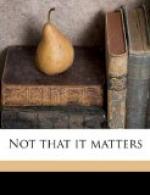Can he tell himself this? I do not see how he can. His increased expertness will be of increased service to himself, of increased service to his clients, but no ideal will be the better served by reason of it. Let us take a case—Smith v. Jones. Counsel is briefed for Smith. After examining the case he tells himself in effect this: “As far as I can see, the Law is all on the other side. Luckily, however, sentiment is on our side. Given an impressionable jury, there’s just a chance that we might pull it off. It’s worth trying.” He tries, and if he is sufficiently expert he pulls it off. A triumph for himself, but what has happened to the ideal? Did he even think, “Of course I’m bound to do the best for my client, but he’s in the wrong, and I hope we lose?” I imagine not. The whole teaching of the Bar is that he must not bother about justice, but only about his own victory. What ultimately, then, is he after? What does the Bar offer its devotees—beyond material success?
I asked just now what were a barrister’s ideals. Suppose we ask instead, What is the ideal barrister? If one spoke loosely of an ideal doctor, one would not necessarily mean a titled gentleman in Harley Street. An ideal schoolmaster is not synonymous with the Headmaster of Eton or the owner of the most profitable preparatory school. But can there be an ideal barrister other than a successful barrister? The eager young writer, just beginning a literary career, might fix his eyes upon Francis Thompson rather than upon Sir Hall Caine; the eager young clergyman might dream dreams over the Life of Father Damien more often than over the Life of the Archbishop of Canterbury; but to what star can the eager young barrister hitch his wagon, save to the star of material success? If he does not see himself as Sir Edward Carson, it is only because he thinks that perhaps after all Sir John Simon’s manner is the more effective.




